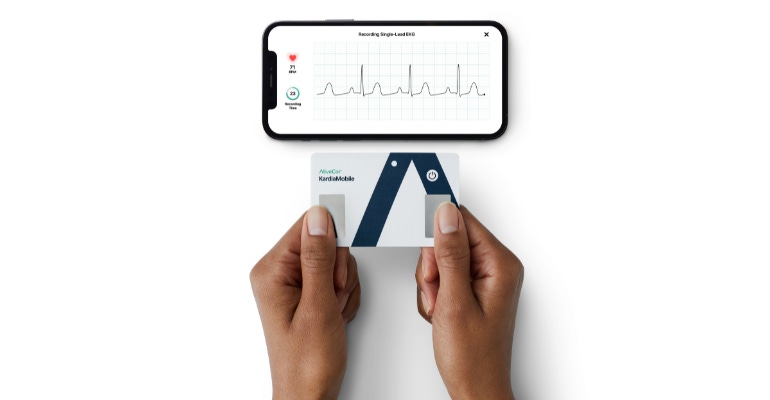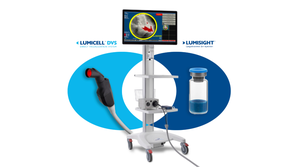AliveCors launched the KardiaMobile Card, a personal ECG (electrocardiogram) device the size of a credit card. What's in your wallet?
February 2, 2022

For just $149, consumers can now carry a personal ECG (electrocardiogram) device in their wallet.
FDA cleared AliveCor's KardiaMobile Card, which the Mountain View, CA-based company describes as "the slimmest, most convenient personal ECG device ever created."
At the size of a standard credit card, the KardiaMobile Card is designed to fit into any wallet and deliver a medical-grade, single-lead ECG in 30 seconds.
"After disrupting traditional ECG monitoring with our game-changing Kardia platform, we have now achieved the unprecedented milestone of creating the first-ever credit-card-sized personal ECG," said Priya Abani, CEO of AliveCor. "KardiaMobile Card delivers the most sophisticated AI in the most convenient form factor ever, putting the power of real-time ECG analysis directly in patients' wallets and furthering our vision of becoming the 24/7 virtual cardiologist for patients when they're not in front of their physician."
KardiaMobile Card pairs with a smartphone using Bluetooth technology to detect six of the most common arrhythmias, more than any other personal ECG on the market, according to AliveCor. KardiaMobile Card users also have access to cardiologist analyses of ECGs, monthly heart health reports, and automatic sharing of ECG recordings. The device's algorithm is based on AliveCor's AI-enabled Kardia technology, which has been evaluated by more than 170 peer-reviewed studies. Designed to resist weather, water, and wear and tear, KardiaMobile Card is AliveCor's most portable and durable ECG available, allowing users to take an ECG recording anytime, anywhere.
"The availability of a personal ECG that fits in a wallet will change the face of remote cardiac monitoring for patients and healthcare professionals alike," said Darria Long Gillespie, MD, an emergency physician and clinical assistant professor of emergency medicine, AliveCor ambassador, and founder of the TrueveLab. "As someone who lives with ventricular tachycardia and has treated patients with arrhythmias, I know how critical it is to access accurate ECG recordings in real time. KardiaMobile Card has made this technology even easier to access, and it has quickly become the most valuable card in my wallet."
KardiaMobile Card comes with one-year access to KardiaCare, the heart health service that offers more than 130,000 members a suite of advanced features to help them better manage and understand their heart health. KardiaCare includes ECG evaluations by board-certified cardiologists, monthly reports that summarize ECG and blood pressure data, automatic sharing of ECG recordings with caregivers, and the ability to detect a broader range of heart conditions.
Evolution of the Personal ECG market
MD+DI Managing Editor Omar Ford hosted Dave Albert, MD, AliveCor's co-founder and chief medical officer, on an episode of the Let's Talk Medtech podcast about a year ago to disuss the evolution of the personal ECG market and the company's milestone successes.
"Today the notion that someone can record their own ECG using a device they bought over the counter, and if they want to, send that data to their doctor for review and to help care for them I think that's an accepted notion today, just as it's accepted that you can prick your finger and measure your blood glucose," Albert said. "When I was a medical student back in the late 1970s you had to go to a doctor’s office to get your blood glucose measured. Imagine the millions of diabetics – they can't even think that that's how it would have to be managed because blood glucose goes up and down with exercise and food ... so now we know we can measure our blood glucose, we can take our blood pressure, we can record our ECG, we can do many things that used to only be done in a doctor's office or a hospital.
So, while the evolution of the personal ECG market has exceeded his expectations, Albert said it has also followed "the path of this thing we call digital health."
Use the player below to hear the full conversation between Ford and Omar.
About the Author(s)
You May Also Like




